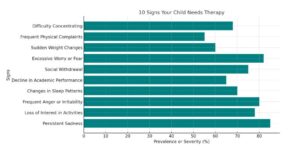Childhood can be a challenging time, filled with both ups and downs. While it’s normal for children to experience a range of emotions, some behaviors may signal a need for professional help. If you notice persistent changes in your child’s feelings or actions, it’s important to pay attention. Recognizing these signs early on can lead to timely support, ensuring your child receives the necessary assistance for their mental and emotional well-being through child therapy Oakville.

1. Persistent Mood Changes
Children are naturally emotional, but consistent, intense mood swings can be a sign of underlying issues. If your child seems to cycle through anger, sadness, or irritability without any clear cause, it could indicate a need for therapy. Such mood changes might reflect struggles with anxiety, depression, or frustration that they can’t express openly. Therapy can provide them with tools to manage and communicate these emotions healthily.
2. Withdrawal from Social Activities
Children typically enjoy social interactions, so if your child has started avoiding friends, family, or activities they once loved, it may indicate a deeper issue. Avoidance can be a way to cope with feelings of sadness, fear, or anxiety. Therapy can help your child understand and overcome these feelings, allowing them to reconnect with people and activities that bring them joy.
3. Decline in Academic Performance
A sudden drop in school performance can be a red flag. If your child’s grades have fallen, or if they’re struggling to concentrate, remember that mental health struggles often affect focus, motivation, and learning. Talking to a therapist could help uncover any emotional hurdles impacting their school life.
4. Excessive Worry or Anxiety
A certain level of worry is normal, but excessive anxiety that disrupts daily activities can be troubling. Look for signs like constant “what if” questions, perfectionism, or avoidance of specific situations. For children in Oakville, specialized child therapy services are available to help manage anxiety, offering coping skills and support to regain a sense of control and calm.
5. Changes in Sleeping or Eating Patterns
Significant changes in sleep and eating habits are common indicators of emotional distress. Some children might have difficulty falling asleep or experience frequent nightmares, while others may struggle with overeating or undereating. These changes can be rooted in stress, anxiety, or other unresolved emotions. Therapy allows children to explore these issues in a safe environment, helping them reestablish healthy habits.
6. Physical Complaints without a Clear Cause
Children often express emotional struggles through physical symptoms. If your child frequently complains of stomachaches, headaches, or other pains that don’t have a clear medical cause, it may be a manifestation of stress or anxiety. A therapist can work with your child to understand and manage these physical responses, teaching them ways to communicate their emotions more effectively.
7. Engaging in Regressive Behaviors
Regression can be seen as a return to younger behaviors, such as bed-wetting, thumb-sucking, or separation anxiety. These behaviors may reappear in response to significant changes, trauma, or feelings of insecurity. If you observe this pattern in your child, it’s often helpful to involve a professional who can help them process their emotions in a more constructive way.
8. Excessive Guilt or Self-Blame
It’s not uncommon for children to feel guilt, but excessive self-blame or constant feelings of worthlessness are cause for concern. Statements like “I’m not good enough” or “It’s all my fault” may point to a negative self-image. Therapy offers children a chance to explore these feelings and build a healthier, more positive self-view. Through tools like cognitive-behavioral therapy (CBT), therapists guide children toward balanced perspectives and greater self-worth.
9. Aggressive or Defiant Behavior
All children have moments of defiance, but ongoing aggression, defiance, or difficulty controlling anger may indicate underlying emotional struggles. If your child has trouble following rules or acts out frequently, therapy can help them uncover and address the root of their frustration. Therapists provide strategies to manage anger, helping children develop positive ways to express and cope with emotions.
Common Signs of Aggression in Children:
- Physical aggression toward peers or family
- Constant defiance of rules and boundaries
- Tantrums that last longer than expected for their age
Therapy Approaches for Aggression:
- Cognitive-behavioral therapy to address impulse control
- Emotion regulation techniques
- Family therapy to improve communication
10. Talking About Death or Self-Harm
This is perhaps the most serious sign and should never be ignored. If your child mentions death, self-harm, or seems preoccupied with the idea of dying, it’s crucial to seek help immediately. Therapists are trained to support children in these vulnerable states, creating a safe space for them to express their feelings without judgment and developing strategies to work through difficult emotions. Early intervention is vital, as it provides tools to manage these thoughts and promotes long-term emotional stability.
| Sign | Description |
|---|
| 1. Persistent Sadness | Your child appears consistently sad or withdrawn for an extended period, losing interest in activities they once enjoyed. |
| 2. Frequent Outbursts | Regular tantrums or emotional outbursts that seem disproportionate to the situation may indicate underlying issues. |
| 3. Changes in Behavior | Noticeable shifts in behavior, such as aggression, defiance, or regression to earlier developmental stages, can be concerning. |
| 4. Social Withdrawal | If your child is isolating themselves from friends and family, it may be a sign of distress or anxiety. |
| 5. Academic Decline | A sudden drop in grades or lack of interest in schoolwork can signal emotional or psychological struggles. |
| 6. Sleep Disturbances | Problems like insomnia, nightmares, or excessive sleeping can be signs of anxiety or stress. |
| 7. Changes in Appetite | Significant weight loss or gain, or noticeable changes in eating habits, can indicate emotional distress. |
| 8. Physical Complaints | Frequent complaints of headaches, stomachaches, or other physical issues without clear medical causes may be linked to emotional problems. |
| 9. Substance Use | Experimenting with drugs or alcohol, even at a young age, is a serious indicator that your child may need help. |
| 10. Trouble Concentrating | Difficulty focusing or paying attention in school or at home can be a sign of underlying mental health issues. |
Wind Up:
Watching your child struggle with emotional or behavioral challenges can be difficult, but timely intervention can make a positive difference. If you notice any of these signs, consider reaching out to a qualified mental health professional. For those in Oakville, child therapy Oakville services offer expert guidance, helping children and their families navigate challenging situations with understanding and compassion. Therapy provides children with a safe, supportive environment where they can explore their feelings, learn coping skills, and build resilience for a healthier, happier future.
Reference
For further insights into recognizing signs of mental health issues in children and effective therapy techniques, the American Academy of Child and Adolescent Psychiatry (AACAP) provides comprehensive resources on identifying and addressing emotional and behavioral issues in youth.
